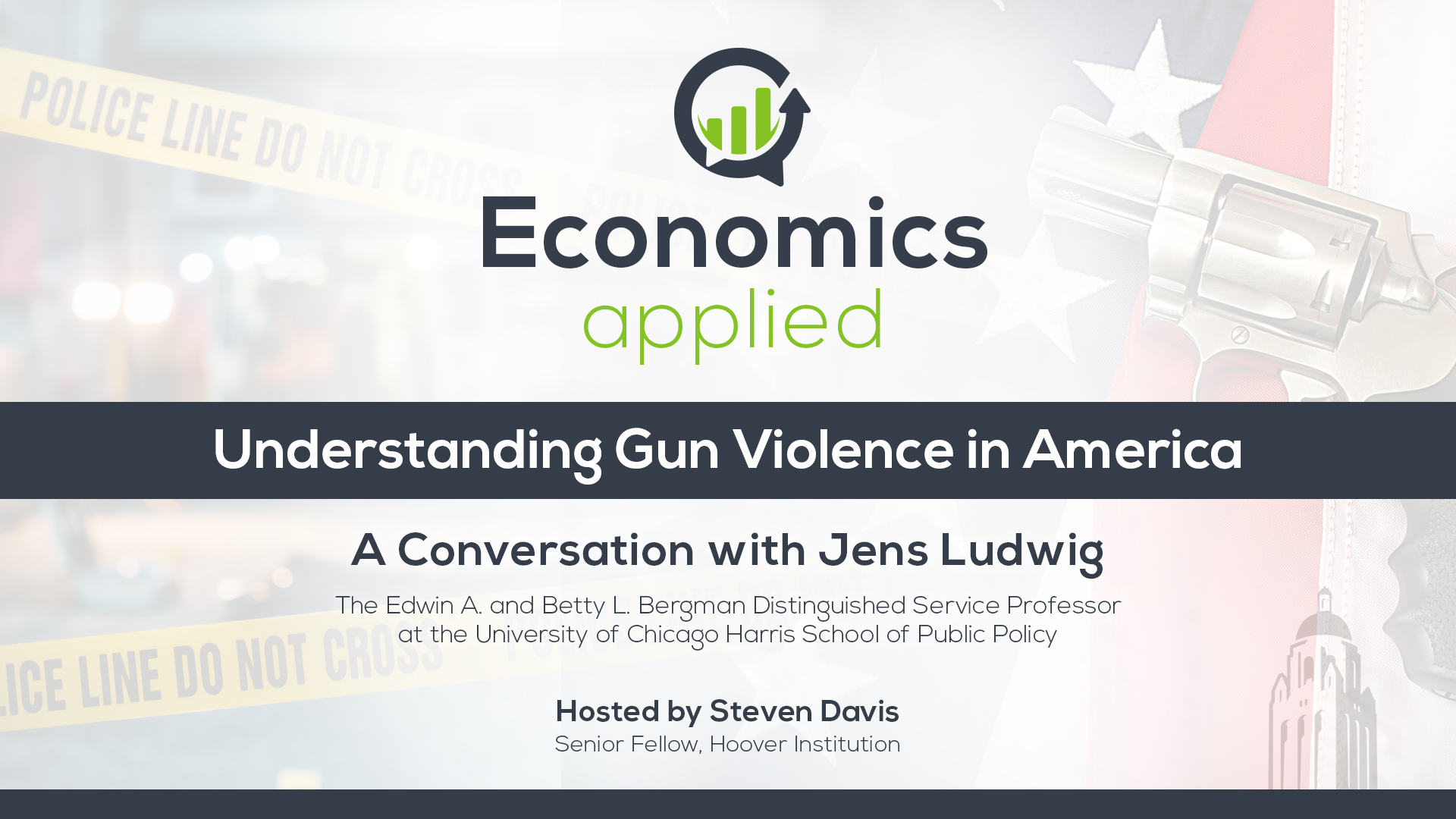- Economics
- Law & Policy
- Politics, Institutions, and Public Opinion
- Answering Challenges to Advanced Economies
Steve Davis speaks to Jens Ludwig about his deeply-researched new book on gun deaths in America. They discuss why America has so many gun deaths, how traditional narratives fail to explain most gun violence, and why past policies failed to reduce the deadly toll. Ludwig also advances a fuller explanation for gun violence, grounded in evidence and behavioral insights.
Recorded on April 23, 2025.
WATCH THE VIDEO
>> Steven Davis: Welcome to a special edition of Economics, Applied. My name is Steven Davis, senior fellow at the Hoover Institution and host of the show. With me here today from the University of Chicago, my former academic home is Jens Ludwig. He heads the University of Chicago's Crime Lab and co directs the NBER Working Group on the economics of crime.
His new book is titled Unforgiving Places, the Unexpected Origins of American Gun Violence. And that book will serve as the basis for our conversation today.
>> Steven Davis: Welcome, Jens, it's great to have you on the show. This is the second time you've been on the show and it's great, great to see you in person this time.
>> Jens Ludwig: Thanks so much, Steve, for having me, it's great.
>> Steven Davis: You have been studying violence, criminal violence, including gun violence, for the better part of two decades. As I understand it, you are situated at the University of Chicago. You live near the university, I did as well for many years.
It's a bit of a oasis of not too much crime, not too much violent crime, but not that far away from communities that have an enormous amount of violent crime. Now, one thing that's apparent on reading your book is your views about how to understand gun violence in America have evolved over time.
Partly based on evidence that you've accumulated yourself and developed, but also based on evidence from many other scholars. So to help us understand kind of the intellectual journey you've gone through, but also to help us understand how you see things today and perhaps persuade some in our audience.
Let's start by just sketching out the traditional narratives or explanations around gun violence in America. Why it is so high compared to most other countries, and also why it differs so much across cities, communities and neighborhood. So give us the traditional views.
>> Jens Ludwig: Yeah, terrific, I've actually been working on this for 30 years, hard as that is to believe.
Yeah, let me start off with the topic that I really started my own research career on, which is gun regulation, gun control. When you look at the data across countries in terms of the murder rate per capita, the US as you said, the US is really an incredible outlier compared to every other developed country in the world.
And almost all of that American exceptionalism is due to mergers with guns. And that leads a lot of people to hypothesize that gun laws are one of the key, if not the key driver, or maybe the only driver in many people's view of the difference between the US and these other countries.
And I think that turns out to be conceptually not obvious because the same thing that makes guns really useful for a criminal to employ during a robbery, very, very lethal, very compact and easy to carry around. Also makes guns really useful for self defense as well. So in principle, there are countervailing forces when you-
>> Steven Davis: Self defense and deterrence, cuz you don't know whether somebody else has a gun.
>> Jens Ludwig: Yeah, thank you, self defense and deterrence. And so a lot of the first part of my career was trying to understand the net effects of having more versus fewer guns out there. It's a very contentious topic in the research literature.
And my reading of the evidence, you might have a different view. But my reading of the evidence suggests that on net, in countries where they have fewer guns, there's fewer murders. There doesn't seem to be a big effect on other types of crimes. But I think the dominant effect seems to be that when you have more guns around, interpersonal violence arguments, fights wind up being more deadly and that's the dominant effect.
And so I think the data would say that if there was some way to substantially alter gun availability in the United States on net, that would improve public safety because it's really murders that is the thing that the public cares about on the crime problem.
>> Steven Davis: So at some level then too many guns is a central problem.
But there's something like 400 million guns in the United States. We're not gonna get rid of them short of two, just hugely draconian policies. So your book is focused, I think, takes as a premise that's going to be with us for a while. And so then what can we do?
How do we understand why violence escalates so often to gun violence?
>> Jens Ludwig: Yeah, Federal gun laws set a floor, not a ceiling on gun regulations in the United States. Cities and states are still allowed to supplement federal gun laws to the extent to which they want. And so there's a lot of activity around the country trying to get cities and states to enact stiffer gun laws.
And some of those can be helpful, but there's a real limit on the degree to which those can help. Because we live in a country in which there's just open city and state borders, right? My family's favorite ice cream store is in Hammond, Indiana, Dairy Bell. We would drive from Hyde park to Hammond all the time.
Nobody checks what's in the trunk of our car on the way back into the city, right? And so I think it's really not to the extent to which there would be any possibility to change laws that would really potentially move the needle. They'd be at the national level, the politics, there are stuck.
So I think a lot of people look at the stuck politics of gun control in Washington, DC, and think, so there's nothing to be done. And I think the good news is that there are two paths to solving the problem, not just one. So the very cartoonishly simple way that I've started to think about this is gun violence equals guns plus violence.
It's gun availability plus the willingness of people to use guns to harm one another. And even if for better, for worse, if the gun situation in the United States is stuck in place, depending on your politics, that's either a good thing or a bad thing, whatever. The good news is, given that, that is as it is, it turns out that there's a lot that we can do to change the willingness of people to use guns to harm one another.
And so I think one overarching argument of the book is the problem is not as unsolvable as it might seem. If you focus exclusively on gun control.
>> Steven Davis: You also bring to the table, I think, and you've reached this point over time, a very different theory of the mind, a theory of how people think.
Than the theory that would be, I'd say, the received theory in economics and maybe other fields of the social sciences, which is it's all the use of guns. The commission of crimes is just a cost benefit calculus. That calculus may differ across people, but based on their morals, based on the situation, the probability of being apprehended, convicted incarceration rates, and so on.
So before we get to the evidence, what is this theory of mind that you think is important for understanding gun violence? And it's not completely inconsistent with the standard theory, but it says the standard theory is incomplete. So lay that out for us.
>> Jens Ludwig: Yeah, let me elaborate a little bit on what the conventional wisdom has been in this area, right?
So I think if you look at the survey data, what you see is that most Americans, when you ask them what causes crime and violence, most Americans point to one of two types of explanations. So mostly people who are on the right, answer survey questions like that with some form of crime and violence are due to characterologically bad people who are just not afraid of the criminal justice system.
And so the only solution is to disincentivize violence with the threat of stiffer criminal justice penalties. And the people who don't agree with that, tend to agree with the second type of statement which says, crime and violence are due to economically desperate people who are doing whatever it takes to feed their families and feed themselves.
The only way to solve that problem is to disincentivize violence by improving the alternatives to crime, the opportunity cost of crime in terms of jobs and income supports and things like that. If you've read Gary Becker's our former University of Chicago colleague Gary Becker, this is a very familiar economic standard, economic way to think about the problem.
The shared assumption is that people are deliberately thinking through the pros and cons, the benefits and costs of what's gonna happen before anybody ever pulls a trigger. And I think for me the starting point to shift my thinking on what's really driving gun violence in America was looking very closely at one gut, what gun violence actually is.
So if you look at the information that we get, most of us, what we understand about gun violence comes from consuming the media. Very few people have first hand experience with this, so you look at the news, you look at entertainment like the wire, you walk away from this thinking that gun violence is like gang wars over drug selling turf.
And there are definitely gang wars over drug selling turf I don't wanna claim that there are. But most shootings in America are not premeditated and they're not motivated by economic considerations. Most shootings in America start with words, they're garden variety arguments that escalate and they end in tragedy because someone's got a gun.
Even before we get to a theory of Human Decision-making, if you just introspect on your own behavior. I don't know if you've ever been in a super heated argument yourself, but I can tell you from firsthand experience, like that is the thinking carefully and deliberately through the pros and cons of-
>> Steven Davis: I've read some of the stories in your book about you're very forthcoming about your past. I don't know how to say it excessively exuberant responses to perceived insults and so on. And I'm glad we're seated some distance apart in case I criticize you to severely in this workshop.
>> Jens Ludwig: It's funny, our University of Chicago colleague, Richard Thaler read the book and he said, Jens, you're a hothead. And I thought, my God, maybe I am really hot head. But I was talking to some very rich civic leader in Chicago and I was talking to him about the book and I said, yeah, I had this really embarrassing experience.
Some other guy's dog attacked my dog and I just lost my mind. And then that guy lost his mind and, and like very, very distinguished guy turns to me and he said, yeah, that happened to me once. Somebody else's dog attacked mine and I picked up the dog and just body swam it.
>> Jens Ludwig: Said that so matter of factly and I'd like maybe help me see, maybe I'm not really so aberrant.
>> Steven Davis: So there's, exactly, so that's actually a key point you're making here.
>> Jens Ludwig: Yeah.
>> Steven Davis: That this tendency to react without, let's say, deliberative slow thinking in these heated moments.
If there's a gun president as well, by one part or the other, things can not just evolve to a fist fight and shoving and pushing, but somebody shooting somebody else. Your claim is that that's actually most of the gun deaths in America. Do I have you right there?
>> Jens Ludwig: Yeah, exactly.
>> Steven Davis: Not all of them, by any means. There is, there is gun violence that fits the kind of standard, standard story. It's calculated, it's premeditated and so on, or it's for obvious economic gain or economic motives. All that goes on, as I understand it. And you agree with this, but you're saying that's actually not most of the gun deaths in America.
>> Jens Ludwig: Yeah, so we have the, we have the best data, the most detailed data for the city of Chicago. And in Chicago, our best estimate from the data is something like 80% of the shootings are altercations or retaliation for some previous altercation.
>> Steven Davis: Okay, and sadly, Chicago supplies a lot of data.
>> Jens Ludwig: Sadly, Chicago supplies a lot of data nationally. I think it's something like 60 to 70% depending on the city and the time period. And so very, very large share of the shootings fall in that category.
>> Steven Davis: Okay I would imagine, you probably know this more than me, that many listeners who comes to this conversation with strong views about the reasons for gun violence, too many guns, too many bad people as I summarized early, dysfunctional families and so on, are listening to you and saying, not really, this guy is one of this academic scribblers who has some simplistic view of the world.
So you use a little rhetorical device, I'd call it early on in the book that is essentially an effort to disarm people and open their minds a bit. You talk about two neighborhoods in Chicago that are side by side. South Shore neighborhood and Greater Grand Crossing neighborhood, these neighborhoods are actually very close to the University of Chicago.
So tell us the story of these two neighborhoods and explain how it is that it kind of highlights the limitations of the standard narratives about what drives gun violence in America.
>> Jens Ludwig: Yeah, so if you don't know the geography of Chicago, South Shore and Greater Grand Crossing, two directly adjacent neighborhoods on the South side of Chicago.
So the boundary between them is Dorchester Avenue.
>> Steven Davis: I used to live on Dorchester Avenue.
>> Jens Ludwig: So you are my neighbor, I used to live on Harper Avenue right around the corner. And so, let's start with the conventional wisdom of gun control being the whole story, just for, for, for starters.
And you can see that the gun laws are exactly the same east of Dorchester Avenue as west of Dorchester Avenue. And yet the shooting rate per capita is twice as high West of Dorchester Avenue and Greater Grand Crossing than in South Shore. Twice as high, it's not a small difference.
So that already tells you that there is a lot more going on than just gun availability and gun laws.
>> Steven Davis: Okay, and these two neighborhoods have similar sociodemographic mixes.
>> Jens Ludwig: Exactly.
>> Steven Davis: Similar income.
>> Jens Ludwig: Exactly, so then, let's take the conventional wisdom of the right that says, the gun violence problem is morality and the willingness of the criminal justice system to hold people accountable.
The criminal justice system is exactly the same east of Dorchester as west of Dorchester. You get arrested by the same Chicago Police Department. You get taken to the same courthouse at 26th in California. In Chicago, you're tried by the same judges, you're put in the same jail. You go to the same Illinois Department of Corrections.
Exactly same criminal justice system. It's very, very hard to believe that morality is fundamentally different east of Dorchester than West.
>> Steven Davis: But let me just push back a bit and get your response on, it's the same criminal justice system, but policing practices could be different in the two neighborhoods for whatever reason.
I don't know if they're the same police precinct on the morality point. Maybe, I don't know, are churches more present in one neighborhood than the other, are they more effective at cultivating moral behavior, whatever that means. So there are other things that could be different between these two neighborhoods which would be interesting to understand and might.
Might feed into the standard narrative or might not.
>> Jens Ludwig: Yeah, I mean, if anything, interestingly enough, if anything, the, the police commander west of Dorchester Avenue is, if anything, more aggressive in making zero tolerance arrests than east of Greater Grand Crossing. So in the neighborhood where gun violence is twice as high, the police are, if anything, doing more enforcement than in the neighborhood where gun violence is low, there's the reverse.
Cuz we could get into that.
>> Steven Davis: So more enforcement in what sense? They are arrest people more?
>> Jens Ludwig: Arrests for misdemeanor offenses.
>> Steven Davis: Arrests for misdemeanor offenses, okay.
>> Jens Ludwig: This is sort of like broken window, zero tolerance police saying in Cook county, it means that you sit in jail overnight and then you.
And then you go home, and you'll probably be assigned a probation kind of thing, right? I think your point is right, which says in principle, the front end of the criminal justice system could be different because there could be different policing practices. Everything post arrest is identical because it all flows through the same Cook county courts.
And if anything, your, your intuition would be that the police commander that's policing more aggressively would be more helpful in a deterrent sort of way. And that doesn't seem to be the case, okay? And it could be that there's maybe one or two more churches east of Dorchester Avenue than west of Dorchester Avenue.
But surely people are not twice as moral east of Dorchester Avenue to explain literally a 2x difference.
>> Steven Davis: So at a minimum, there's a puzzle here and to be explained, and we'd like to understand what's going on there. And correct me if I'm wrong, but you see this, this particular side by side neighborhood comparison as something of an exemplar or an illustration of what's true more broadly across localities and neighborhoods in the United States.
There's just a tremendous amount of variation in the level of gun violence that does not fit neatly into the standard narrative.
>> Jens Ludwig: Exactly, and just to point out that the conventional wisdom of the left can't explain this either, right?
>> Steven Davis: That's right, yeah.
>> Jens Ludwig: Most neighborhood, both neighborhoods, South Shore and greater Crown Crossing, they have almost exactly the same average household income and poverty rates, right?
And so, this goes to your point too. If morality were fundamentally different, you would think that employment is different or whatever it is. You don't see that?
>> Steven Davis: And I wanna interject here, that's one problem with a conventional narrative on the left. The other problem is it kinda wants to solve all of society's problems first as a way to reduce gun violence.
That just doesn't seem like a very practical approach.
>> Jens Ludwig: Yeah, well, I agree that we cannot have gun violence be the thing that we have to solve everything else in order to solve. I totally agree with that, but even if we had a button that we put that we could push that would end concentrated poverty and segregation in Chicago.
The fact that South Shore and greater Grand Crossing have almost exactly the same racial composition, almost exactly the same economic composition. And yet shootings are twice as high in greater Grand Crossing as in South Shore tells you that even pushing that button that would end all of these upstream root causes, there would still be a huge part of the problem that that button could not touch.
It's even setting aside how hard it would be to change these big social problems.
>> Steven Davis: Okay, I see that, but I think the more basic point is we're not going to solve these root problems. We're not gonna get rid of 400 million guns or 390 million of them overnight.
So how do we explain the variation that we see across lower income neighborhoods, for example, in Chicago or elsewhere? What can we do that actually might work to reduce that? And we'll get there, but the standard narratives don't seem to explain what we see. And so the policy prescriptions coming out of the standard narratives are probably not going to work as intended as advertised, yeah, I got it right.
>> Jens Ludwig: Yeah, exactly, so I think the big breakthrough for me and my thinking on this was the fact that so many of these shootings stem from arguments rather than gang wars over drug selling turf. And that leads you to then try and understand what people are doing in those sorts of situations.
Partly that's through introspection, and partly that's looking at what all sorts of social science is, not just the standard economical way of thinking about behavior. Have thought about behavior, this leads you to a bunch of things in psychology and behavioral economics. Or led me to a bunch of things in psychology and behavioral economics.
I think one of the biggest breakthroughs in those fields over the last couple decades is the recognition that there are two types of thinking that our minds do of which we are aware of only one. The sort of voice in our head, deliberate thinking, plan fall, the ability to be rational.
Not to say that it's always rational, but the ability to be rational and carefully weigh pros and cons the way that Gary Becker would say that people are thinking through crime. And that's true for property crime. It seems to be true for property offending, this is what Danny Kahneman, in his wonderful book Thinking Fast and Slow, calls System two that slow thinking, very mentally effortful.
Because it's so mentally effortful, our minds have developed a second type of thinking that's much less mentally effortful. What happens below the level of consciousness, Kahneman calls this System one thinking. Some people call it fast thinking. It's basically a series of automatic responses that we develop to deal with routine, usually low stakes things that we see in our daily lives and are just very adaptive.
They normally help us. You see a piece of text you don't deliberately think through. Should I read this? You just automatically, almost involuntarily read it, and my argument is that a lot of the shootings that we have in the United States are due much more to System one than we have traditionally appreciated.
All of our policies have been focused on disincentivizing system 2. When I think that helps explain why we haven't made lots more progress.
>> Steven Davis: I wanna flesh out this a little bit more, but I think it might be useful. You tell a lot of stories. Real world stories in the book, sometimes about yourself, but often about others who were.
Who are involved in situations that escalate to gun violence, or could escalate the gun violence. Maybe you wanna tell us one or two of those stories that involve an argument escalating to gun violence and just explain to us how it is that it doesn't look like this is really the standard narratives based on System two type thinking, but instead what you call System one, or Daniel Kahneman caused System one, or fast thinking.
Give us a couple stories to kind of really illustrate the point that is at hand here.
>> Jens Ludwig: Let me give you an example that puts me front and center because I want to really underscore a point that I think is central to the book. And I hope this comes through, which is, I really do think that there are universal features of human decision making and cognition that are not specific to, you know, there are psychopaths out in the world.
So I wanna be clear. I recognize that there are people who really are in the extreme tail of the distribution. But the 80% of the shootings that stem from arguments. I think most of the people who are involved in, in those shootings are a lot like everybody else.
They're not aberrant or deviant or fundamentally different, they're just in very difficult situations that make the sort of mistakes that you and I would make every day have much more severe consequences. And so the reason that I tell a lot of stories about myself is to sort of underscore there's something universal about human beings and how we operate that is central here.
And then it's the situations that determine the consequences of that. So the one of the stories that is central to the book is about me. Every Wednesday, I lived in Hyde park just south of Powell' Harper, if you know that part of Hyde Park. And every Wednesday morning I would lace up my running shoes, put in my AirPods.
Around 6:15 in the morning I do a walk and talk with the senior leadership of my research center, the crime lab, walking my dog, Aiko. So Aiko is a part German shepherd, part hound dog mix, it's not a small dog.
>> Steven Davis: All right.
>> Jens Ludwig: I leash her up, I start walking down, walking around Hyde park and I hear the most blood curdling sound.
I mean if this is a dog off leash tearing down a driveway in Hyde park towards my dog and if you've never owned a dog, you've never had another dog off leash attack your dog. It is petrifying. Teeth, dogs are designed, dogs are designed by nature to be petrifying when they're trying to be petrifying.
So big fangs barking, snarling, drool flying up in the air, the things tearing down the driveway. I experience an adrenaline surge. The rational sort of system to Gary Becker sort of thing to think about this. It turns out that the dog and I knew I could see the dog's owner sort of trailing the dog.
The dog's owner turned out to be somebody else who works at the University of Chicago, whose kids even go to my kids school.
>> Steven Davis: One University of Chicago prof shoots another could have been the story.
>> Jens Ludwig: So the rational part of me could have come up with a dozen very reasonable ways to solve this problem, right?
It's, I'm not the strongest guy in the world, but I can pick up a 65 pound dog, right? I could just have picked up my dog and gotten her out of the way. I could have let her off leash so she could run away. I could have put myself in front of.
Or I could have just thought the worst thing in the world is the dogs get into a fight. If my dog gets hurt, I'll just take her to the vet, she'll get stitched up, no Big deal. The worst thing to do from a rational perspective would have been to escalate this thing with another University of Chicago faculty member in front of the whole Hyde park is a little University of Chicago fishbowl.
Everybody sees everything, all the neighbors are out, whatever, and the senior leadership team of my research center is on my headphones listening to the whole thing, all right? Unfortunately for me, that rational part of my brain was nowhere to be found, all right? So poker players talk about they're playing poker and when they start to get frustrated and become a little bit emotional, they call it going on tilt.
That's another way to say, you start to get emotional and rely on system one more than you realize. It's named after a pinball machine, that if you smack it or you lift it up, it gives you an on tilt error message, all right? I was fully and thoroughly on tilt in the moment, not thinking clearly.
And I just used every 4, 7 and 12 letter word that I knew against this neighbor. I assume this is a family show. I won't tell you all of the horrible things that I said, but you can imagine what I said. And with the senior leadership team listening to everything as I'm screaming these horrible things at this guy, okay?
Now all of that, there's an explanation. Okay, so one of the key insights about behavioral economics to me, all right? That makes it useful in the world is not that people make mistakes, right? That's not super useful by itself. It's that people's mistakes have a predictable structure. I mentioned before, People's System 1 responses develop because they often are useful for us.
It's hard to believe that nature would have us develop a capacity for system 1 responses that were always maladaptive in every situation. What sense would that make, right? Let me give you one example. Our system ones are torqued in the direction of what psychologists call egocentric construal. We tend to personalize things, right?
>> Steven Davis: See everything through our own eyes.
>> Jens Ludwig: Exactly, everything through our own eyes-.
>> Steven Davis: Something about how we think the other person is thinking.
>> Jens Ludwig: Exactly, and a friend of mine described it as, in everyone's mind, the world is a one person play and they're the star of the show kind of thing.
Everything is about us, right? And that usually works super well for daily life. If I'm in the kitchen in my house in Chicago and my wife or my sixth grade daughter comes in looking super Pissed off and won't talk to me. There's a very real chance that I did something dumb, and that really is about me.
I'm sorry is a very perfectly useful initial default response. What did I do? What can I do to be helpful? Sometimes it wasn't me, but often it was. It's really helpful when I'm preemptively, okay, but that normally useful kind of egocentric construal personalization in this case, this is a very out of the ordinary case, right?
Having some other dog off leash chasing towards me leads me to a ser. System one sets a default. This is being done. This is about me. And so then system two, in the wake of that system one misconstrual, starts asking questions like, why in the world would this guy let his dog attack mine?
Why would he do that, all right? What does he have against me? What does he have against my dog? Why is he being such a jerk to inconsiderate and on and on, right? If you think about this rationally for just half a second, the overwhelming likelihood here is that his dog just slipped his leash or something like that.
But egocentric construal, which normally helps me, leads me into a mindset here and a chain of thinking that just led me to completely lose my mind. The fact that we can sort of make sense and we all engage in this all the time, not all of us wind up in a situation where another dog might attack mine.
Now to just sort of preview where we're going to go eventually to solutions, let me just point out. So the flip side of this, right? The flip side of this is like this guy then starts screaming his head off at me too. And from his perspective, again, he's seeing the world through his eyes.
From his perspective, I should clearly have known this was an accident. And all of a sudden I'm acting like a madman, screaming these horrible things at him in front of his house where his wife and kids are, right? And this, I think is like a really insightful point about violence, the offenders usually view themselves as the victims, right?
Just as a point to underscore how important perspective taking is for all of these events. And so we're yelling each other, and the thing that saved us is that a, so the University of Chicago spends a fortune having University of Chicago police cars and unarmed private security guards driving around the neighborhood all the time.
One of the security guards drove by, sees us screaming at each other, rolls down the window and says, is everything all right, or do I need to get a cop over here? And so that's an example of, 60 years ago, Jane Jacobs, in her book Death and Life of Great American Cities, talked about the importance of eyes on the street, people around who are willing to step in and deescalate things.
Luckily for me, there was an eye on the street at the time in the form of a security guard who broke it up. And that didn't lead to anything. But if one of us had a gun and there was no eye on the street, who could have stepped in to interrupt that?
Who knows where that would have gone?
>> Steven Davis: So let me make several comments in response to that, because there's a lot there. First, I'm imagining your research team leaders thinking, that he'll do anything for another data point.
>> Jens Ludwig: It's all about, as an economist, it's all about sample size.
I'll do whatever it takes.
>> Jens Ludwig: Yeah, that's great.
>> Steven Davis: That's a joke, but I wanna make a serious point. The 80% figure you cited, okay, and you're very clear about this in the book, but I wanna be clear about it here as well. That's a best estimate, and I think it's based on data from Chicago.
>> Jens Ludwig: We get data from, from Boston. We have data from a bunch of cities collected in all sorts of different, all sorts of different ways.
>> Steven Davis: The point I wanna get is there's actually a lot of uncertainty as to what share of gun deaths should be attributed to this kind of argument, escalation that you described.
I think you make a reasonable case in the book that is probably more than half, but we don't know exactly how much. And is that a fair statement? I just wanna be clear about that point.
>> Jens Ludwig: Yeah, I mean, the way that I would say so I spend a bunch of time trying to.
It's a very, very important, stylized fact. And so I spend a bunch of trying to really, really nail down that, that issue because it is so central to this way of thinking. And I would just say, like, partly it is looking at data collected from different sources. Chicago, it comes from the police department in Milwaukee where you see a very similar figure.
They bring together all sorts of government agencies that know what's going on, and they do like a social autopsy of what's going on. And then we have interventions that act just on sort of system One where you see up to 50% changes in violence. And so I think if you triangulate and put these data points together, I take the uncertainty point, but I think a, a very large share of these arguments.
>> Steven Davis: That's really the central point-.
>> Jens Ludwig: The central point, exactly.
>> Steven Davis: The rest of the book rests. We don't have to get into quibbles of whether it's 80% or 65%. And in fact basic economic thinking would suggest that it won't be the same across time and space. For example, succeeded in reducing gun violence due to system one thinking, then presumably there'd be a lot left.
More left over as a share.
>> Jens Ludwig: Exactly, yep.
>> Steven Davis: For the kind of gun violence that fits the conventional narrative. But I wanted to make another point, which I think you'll agree with me, you can tell me if you don't. There is actually potentially quite a positive role to be played by a police presence, a heavy police presence.
It's just not the sort of policing we might associate with. I'm trying to think of some of the TV shows where the police officers are really heavy handed. I'm gonna enforce the law or follow through on arrest and conviction. But there's multiple roles for police to play. Was this a University of Chicago police officer?
>> Jens Ludwig: It was a University of Chicago private security guard.
>> Steven Davis: Private security guard, so there are University of Chicago police officers, private security guards. And then the City of Chicago Police, there's the transit police. You see all of these in Hyde Park. I do recall when I first moved to Hyde park thinking this is the most heavily policed neighborhood I have ever seen, probably by an order of magnitude.
>> Jens Ludwig: Yep.
>> Steven Davis: And it remains heavily policed today. But these police are doing multiple roles, including the kind of argument interruption, prevent violent escalation, as in your example. And you don't say this in the book, but I don't want anything to come across in this talk as you're against big police presence.
There's actually a lot to be done for proper. There's a lot to be said for proper policing.
>> Jens Ludwig: Yeah, exactly, yeah, totally. And I think when sort of the standard economist way to think about what police do to reduce crime is you think it's, it's deterrence and incapacitation.
So we're deterring criminals through the threat of arrest. And then we're arresting them and getting them off the street. The average Chicago cop makes about three arrests per year, maybe. Maybe that level of arrest activity is enough to generate some huge deterrence. But I think there's something else going on to your point, and I've seen it firsthand, right.
There was a multi year stretch where every other week I'd go around with the Chicago police on the south side, see what they do. And I'll just tell you two very quick stories. One night, it's, one or two in the morning, and I'm with a police sergeant in some, very dark back part of the city.
And we turn a corner and there's a guy who's got a woman pinned up against a chain link fence. She's holding a little kid's hand, and the guy is two inches from her face, just screaming. You can see the veins bulge in her neck. And the sergeant, pulls over and says, hey, buddy, I think you should go take a walk.
And the guy says, everything's okay here. And the sergeant says, you're taking a walk. Maybe he used some other language in there as well. But you can sort of see it's, that's not a situation where the police could make an arrest for anything there hadn't been a crime.
But it's also very clear that if the cop hadn't done anything, that would have turned out most likely to have been a very, very bad situation. I'll give you one other example where I'm in the back of a police car, there are two cops up front. On a Friday night on the south side, there's a call.
Huge brawl in the middle of the street. So lights and sirens, they're going 70 or 80 miles an hour over surface streets. We pull up, there's just tons of people out in the middle of the street. And it turns out that the cops jump out of the cars.
They're, everybody shut up. What's going on? It turns out that a teenage girl on one side of the street had been dating a teenage boy on the other side of the street, they break up. Somebody in the teenage girl's family decides it would be a good idea to walk across the street, walk into the boy's house, and punch him in the face in front of the rest of the family.
And then it's just chaos. And the cops say, all right, look, everybody go back into their house, and if we have to come back, we're arresting all y'all. In that particular case, it's a form of short term effective mediation that maybe is not as helpful as it could be in the long term.
We get in the car, I turn to the sergeant, I say, do you think that solved the problem? He's, no, we're definitely gonna come back here again later tonight. And I just wanted to add, so I'm a big believer in the importance of police and police presence and their ability to serve as eyes in the street, especially in situations where no neighbor wants to get in the middle of that, right?
It's only the police who are willing to step in to 20 people fighting each other in the middle of the street. But I do think as a complement to that, you know there are all of these non profits doing what they call violence interruption. I do see also a really useful role for that type of paid eyes on the street as well because like.
The family on this side of the street and the family on that side of the street aren't moving anytime soon. They've got to figure out a way to sort of get past this and be able to live with one another. On a Friday night in the south side of Chicago, every 15 minutes is a shots fired or man with a gun call.
The cops don't have the time or the training or the temperament to sort of sit there and mediate this for an hour. We were there for 15 minutes, got everybody back in the house, cops drive off. We need something to sort of come in behind and mediate. But you can see how both of those systems could really be so helpful and important and complementary, right?
>> Steven Davis: So one part of your argument about thinking that we haven't yet developed maybe as full as we should, is it's not just that, and correct me if I'm wrong, because I understand your argument. It's not just that in a moment of a heated argument, people tend to automatically revert to system one thinking.
And this is where the title of your book comes in unforgiving places, they are more likely to find themselves in certain neighborhoods in the United States in highly stressed situations. Where the system one response will lead to a violent outcome, possibly a death by gunshot that they would not have engaged in if they'd been able to step back on both sides, calm down and think rationally.
So why is it that in some neighborhood, let's just call the error rate of system one thinking for a situation, why is that error rate so much higher in some neighborhoods in the United States than in others? And then it's the interact, it's the combination of that with the availability of guns.
That's your explanation for why these two side by side neighborhoods in Chicago, for example, differ so much in the homicide by gun rate.
>> Jens Ludwig: Yeah, exactly, so going back to South Shore and Greater Grand Crossing, this System one, system two, dual system model of cognition is universal. This is true for all of us.
So what is it then about Greater Grand Crossing in South Shore that's different? So my friends Sendal Mullainathan and Eldar Shafir have a wonderful book that came out about a decade ago called Scarcity. Where they point out that when people are under stress, the reason that we have system one is because system two, our slow thinking is very effortful.
And so we rely on system one to conserve on mental bandwidth. And they point out that there are a bunch of things that are stressful to people that mental bandwidth tax leads us to rely more and more on system one. And there are lots of things that we can see in the data that would make you think that Greater Grand Crossing imposes a much greater mental bandwidth tax on people who live there.
So let me just give you a couple examples. Like one example for starters is you can see pretty clearly in the data that Covid, for instance, hit Greater Grand Crossing much harder than it did in South Shore. So the number of people who are grieving the loss of a relative or a friend one or two or three degrees of separation in their social network is much higher in Greater Grand Crossing than it'll be in South Shore.
If you look at 3, 11 data on calls for things like graffiti and other sorts of disorder, that's much more common in Greater Grand Crossing as well. And we have a bunch of research that suggests that that sort of disorder is very sort of psychologically taxing to, to people as well.
And so I think, you know, for starters, there are reasons to think that Greater Grand Crossing is imposing a much bigger bandwidth tax that is putting people. At greater risk if we going on with-.
>> Steven Davis: So every day example of this is that, If I'm tired or highly stressed, I'm more likely to snap at someone or lose my temper.
That's just an everyday version of this.
>> Jens Ludwig: Yeah, exactly, exactly, exactly. And so there's a bunch more things in the environment that are stressing people out in greater-
>> Steven Davis: Okay, that's part of it, more few of them, right?
>> Jens Ludwig: So that's part of it. And there are two other parts to it, I think.
The other part of it is you can see in the data that there just seem to be fewer eyes on the street in Greater Grand Crossing than in South Shore, right? I was saved in Hyde park by the University of Chicago security guard driving by and stepping in and intervening by accident of geography.
That South Side geography as well as I do. But for those who don't know, Chicago South Shore has the great advantage of being located along. To me, the best thing about Chicago, which is our beautiful Lake Michigan. And I think as a result of that accident of history, there's just, as you know, there's tons more commercial development in South Shore than in Greater Grand Crossing.
And as Jane Jacobs was writing 60 years ago, this sort of mixed use development where you have stores interspersed with residential is really useful in drawing people out of their homes and out into public places. Where pro social adults have the opportunity then to sort of step in and act as eyes in the street, eyes on the street and deescalate things.
And so when people, you know, you're more likely to go on tilt, rely on System 1 and Greater Grand Crossing. And when that does happen, conditional on that happening, you're less likely in Greater Grand Crossing to have somebody around who's willing to, willing and able to step in and say, you don't want to do this, knock it off, it's not worth it, just go home kind of thing.
And then the third thing that you, you mentioned, which is just super unhelpful as well, is as best we can tell in the data, there's just lots more gun carrying in greater ground crossing. So more guns out in public when people do gun silence.
>> Steven Davis: Interestingly, by itself can be a rational system two response to the concerns about system one violence or system two violence.
>> Jens Ludwig: Yeah, no-
>> Steven Davis: That's the thing, so you can easily get kind of a divergence in what's the privately optimal degree of gun carrying.
>> Jens Ludwig: Yeah, yeah, totally. And I think this is an underappreciated, how cities think about regulating illegal gun carrying is a genuinely hard thing, right?
Because, I think everybody could look at New York and other examples around the country where heavy-handed policing generated real costs to communities. I think the reason that it's complicated is in a lot of areas of life, we metaphorically talk about arms races with respect to gun carrying in public.
This is a literal arms race. When you look at survey data, for instance, and you ask teenagers why you're carrying a gun, they say it's cuz everybody else is carrying a gun and you can wind up in a very bad equilibrium where you have tons and tons of guns out in public.
>> Steven Davis: But I wanna follow up on that with a question. When you say heavy handed policing, it seems to me when one form of heavy handed policing, and maybe this is not what you meant is, and this was an issue in New York City, as I understand it, stopping people for low level infractions and searching them for guns.
And if they're unlawfully carrying a gun, taking it away. And that in part is an effort to change the equilibrium, to make the teenage think, well, you know, if I walk around on the street and the cop stops me for whatever reason and he frisks me, I'm going to have to give up my gun, which is expensive and I may spend a few hours in jail, I may get in trouble with my probation officer.
So is that a heavy handed form of policing that doesn't work well, and if so, why not?
>> Jens Ludwig: Maybe heavy-handed is an overly maybe normative, that has some sort of editorializing behind it. So let me say it this way, which is the sort of policing strategy that you describe inevitably winds up involving lots and lots of stops where the cops don't find the person.
They don't find any contraband on the person, they don't issue a citation or make an arrest. In some share of those, they do wind up getting a gun off the street. And I think different people have very different normative views about what the acceptable ratio is of stops that don't lead to anything, to guns taken off the street.
And whatever your views are, my views are, whatever, I think you can see playing out in American cities. That's just a very politically fraught conversation.
>> Steven Davis: That's true, but I'm just trying to get to the factual question is if you went to certain neighborhoods in Chicago that have lots of gun violence and you adopted a strategy.
And let's set aside whether it's a politically feasible strategy for the moment of frisking, and it would often be young black men who are getting frisked. I think that's part of the more young minority men getting frisked, that's part of the political controversy. Would that be productive or unproductive in reducing the level of gun violence?
>> Jens Ludwig: Yeah, and I think I talk about this a little bit in the book. I think the data suggests that stops can help get illegal guns off the street. And then I think it's a normative decision by the voters in a given city, and I think you can do that in a way that generates more versus less collateral damage or collateral something in a community.
I think the data suggests that does help get illegal guns off the street, and then it's a political question about whether the costs are worth it to a city's residents or not. And I think the flip side of it as well is we'll talk in the solutions. We'll talk about solutions soon.
But we've also seen examples of social programs that are capable of getting kids, convincing kids to leave guns at home. You can see arrests go down not just for violent crimes, but also for illegal gun carrying. And so it's not just policing that gives us a way to try and get guns off the street, yeah.
>> Steven Davis: The point I was trying to get to is that if you can reduce the level of gun carrying or perceived gun carrying in a given neighborhood, then everybody else has a smaller, a reduced incentive to carry a gun for purposes of self defense.
>> Jens Ludwig: Yep.
>> Presenter: Tune in for the next episode of Economics, Applied as Steve and Jens continue their conversation, this time focusing on practical low cost solutions to gun violence.
Available May 20, 2025.
ABOUT THE SPEAKERS
Jens Ludwig is the Edwin A. and Betty L. Bergman Distinguished Service Professor at the University of Chicago’s Harris School of Public Policy. He is also the Pritzker Director of the University’s Crime Lab and codirector of the NBER’s working group on the economics of crime. His latest book, just out from the University of Chicago Press, is titled Unforgiving Places: The Unexpected Origins of American Gun Violence.
Steven Davis is the Thomas W. and Susan B. Ford Senior Fellow and Director of Research at the Hoover Institution, and Senior Fellow at the Stanford Institute for Economic Policy Research (SIEPR). He is a research associate of the NBER, IZA research fellow, elected fellow of the Society of Labor Economists, and consultant to the Federal Reserve Bank of Atlanta. He co-founded the Economic Policy Uncertainty project, the U.S. Survey of Working Arrangements and Attitudes, the Global Survey of Working Arrangements, the Survey of Business Uncertainty, and the Stock Market Jumps project. He also co-organizes the Asian Monetary Policy Forum, held annually in Singapore. Before joining Hoover, Davis was on the faculty at the University of Chicago Booth School of Business, serving as both distinguished service professor and deputy dean of the faculty.
RELATED SOURCES
- Unforgiving Places: The Unexpected Origins of American Gun Violence by Jens Ludwig, 2025
- Jens Ludwig, personal website
- Crime Lab, University of Chicago
- Thinking, Fast and Slow by Daniel Kahneman
- The Death and Life of Great American Cities by Jane Jacobs
- Economics of Crime, NBER working group
- “Does Nothing Stop a Bullet Like a Job? The Effects of Income on Crime,” Annual Review of Criminology, 2025



















